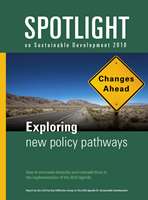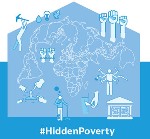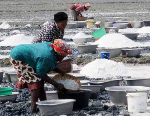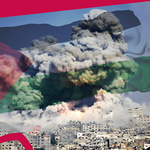Social Watch news
Published on Thu, 2019-06-20 15:18
The issue of inequalities between countries is often conceptualized and measured in terms of GDP. Moreover, the way to reduce these is often implicitly assumed to be convergence upwards through rapid growth. However, although economic growth may be important for many countries (especially LDCs), global convergence with the GDP of the richest countries would be environmentally catastrophic without "decoupling" growth from nature destruction.
|
Published on Mon, 2019-06-17 09:14
The Political Declaration for the High Level Political Forum will be adopted by Heads of State and Government (HOSG) at the General Assembly’s Sustainable Development Goals (SDG) Summit in September 2019. With the aim of reaching consensus, Member States have started negotiations and are now deliberating a second draft of the Political Declaration. The Declaration is currently titled, “Gearing up for a Decade of Action and Delivery for Sustainable Development: Political Declaration of the SDG Summit” and is divided into three sections: “I. Our Commitment, II. Our World Today, III. Our Call to Accelerated Action.”
|
Published on Fri, 2019-06-14 10:46
“Ending poverty in all its forms everywhere” - the overaching goal of the 2030 Agenda for Sustainable Development - reflects the growing consensus on the need to consider other dimensions, beyond monetary ones, when thinking about poverty.
Last May, ATD-Fourth World and the OECD organized an international debate on “Addressing the Hidden Dimensions of Poverty” that advocated for multidimensional and participative approaches. The "Merging Knowledge" methodology, bringging together people living in poverty from different regions with academics and practicioners evidenced that despite differences in income, the daily lives and feelings of poor people across countries, are surprisingly similar.
|
Published on Fri, 2019-06-14 09:41
"As of 2019, women’s representation in Parliament remains at an abysmal 13.7% and women constitute only 18.55% of all ministerial appointments. For the first time since its creation, the Gender Ministry no longer has cabinet status. Sexual and gender-based violence remains a big problem, notwithstanding the existence of the Domestic Violence Act, and budgetary allocations for effective implementation of the law is low." This is one of the conclusions about gender disparities in Ghana, as diagnosed by NETRIGHT, a network of about 100 civil society organizations and over 300 individuals. Netright believes that "the conditions of marginalized or disadvantaged groups, including women, can never be improved solely through their own efforts, no matter how dynamic they might be, since systemic barriers and structures of male privilege and dominance maintain the status quo."
|
Published on Tue, 2019-05-28 09:11
The Philippine Congress, particularly the Senate, has a handful of days left to pass important legislation. One of the urgent bills that the Senate should pass is the increase in the tobacco tax rate.
The Executive has strongly endorsed the bill of Senator Manny Pacquiao and has even certified its urgency. Pacquiao’s bill proposes a tax rate of P60 (against the current rate of P35). Subsequently, the rate increases by 9% annually to keep cigarettes less affordable in light of rising income and inflation. Senators Sherwin Gatchalian and JV Ejercito have bills that introduce higher rates — P70 and P90, respectively.
|
Published on Mon, 2019-05-27 17:42
Ghana has the best endowment for and is the biggest producer of solar salt in West Africa. The bulk of the production and export comes from artisanal and small scale (ASM) producers. Third World Network Africa (TWN-Af) presents a research report "Towards Optimal Expoitation of Salt from the Keta Lagoon Basin in Ghana" based on struggles between a large scale salt company and some communities around the Keta Lagoon in Ghana. At the centre of the conflict is the disruption of the livelihoods of the communities by the award of a concession to a foreign investor for large scale salt production, an act which has expropriated what the communities see as the commons around the lagoon where for generations they have carried out livelihood activities which combine fishing, farming and salt production.
|
Published on Mon, 2019-05-27 16:36
Roberto Bissio, coordinator of Social Watch, Barbara Adams and Jens Martens from Global Policy Forum participated in the session “Civil Society Shadow Reporting: Meaningful Participation in the Voluntary National Review Process”. The Session was co-organized by Social Watch, Global Policy Forum, GCAP and Action for Sustainable Development and it was held in the framework of the Global Festival of Action on 2nd May 2019 in Bonn, Germany.
|
Published on Mon, 2019-05-13 12:09
Spain submitted its first Voluntary National Review in 2018 and the alternative report by La Mundial regrets the lack of dialogue on the SDGs between the government and stakeholders like academia and civil society. Spain is seen as starting late to take note of the 2030 Agenda and the High Level Group (GAN in its Spanish acronym) was perceived by civil society as not having the required political standing or participation of key ministries. Further, civil society feared that the policies required to achieve the SDGs would be undermined by the continuity of policies of fiscal austerity and shrinking rights that were pushing Spain away from the agreed goals and targets.
|
Published on Mon, 2019-05-13 12:06
Austerity is a major concern for civil society in Jordan. According to the alternative report by Ahmad M. Awad, from the Phenix Center, Measures of ‘fiscal consolidation’ started in 2016 as a condition to unlocking access to IMF aid. Austerity measures were thus implemented, leading to rises in fuel prices, as well as in both the sales taxes and customs.”
Nearly half of the Jordanian labour force works in the informal economy, which together with “the continued implementation of business-friendly labour policies, resulted in rising unemployment. Many began to see their ability to afford basic commodities threatened – a predicament termed 'transient poverty.' Among unskilled workers, waves of migrant workers and refugees (many desperate) have saturated the market – one hardly bound by any minimum-wage constraints – triggering a race to the bottom.” At the same time, “numerous political and legislative institutions had been severely weakened.
|
Published on Thu, 2019-05-09 20:14
The Palestinian Non Governmental Organizations Network (PNGO) calls upon the international community to immediately pressure the Israeli occupying forces to stop attacks on the Gaza Strip. PNGO condemns the Israeli occupying forces continuous barbaric attack on Palestinian civilians especially children, women, civilian homes, cultural institutions and media outlets.
Urgent Call for Action PNGO calls upon the international community to immediately pressure the Israeli occupying forces to stop attacks on the Gaza Strip Palestinian Non Governmental Organizations Network (PNGO) condemns the Israeli occupying Forces continuous barbaric attack on Palestinian civilians especially children, women, civilian homes, Cultural institutions and media outlets.
|
SUSCRIBE TO OUR NEWSLETTER
Submit

|












